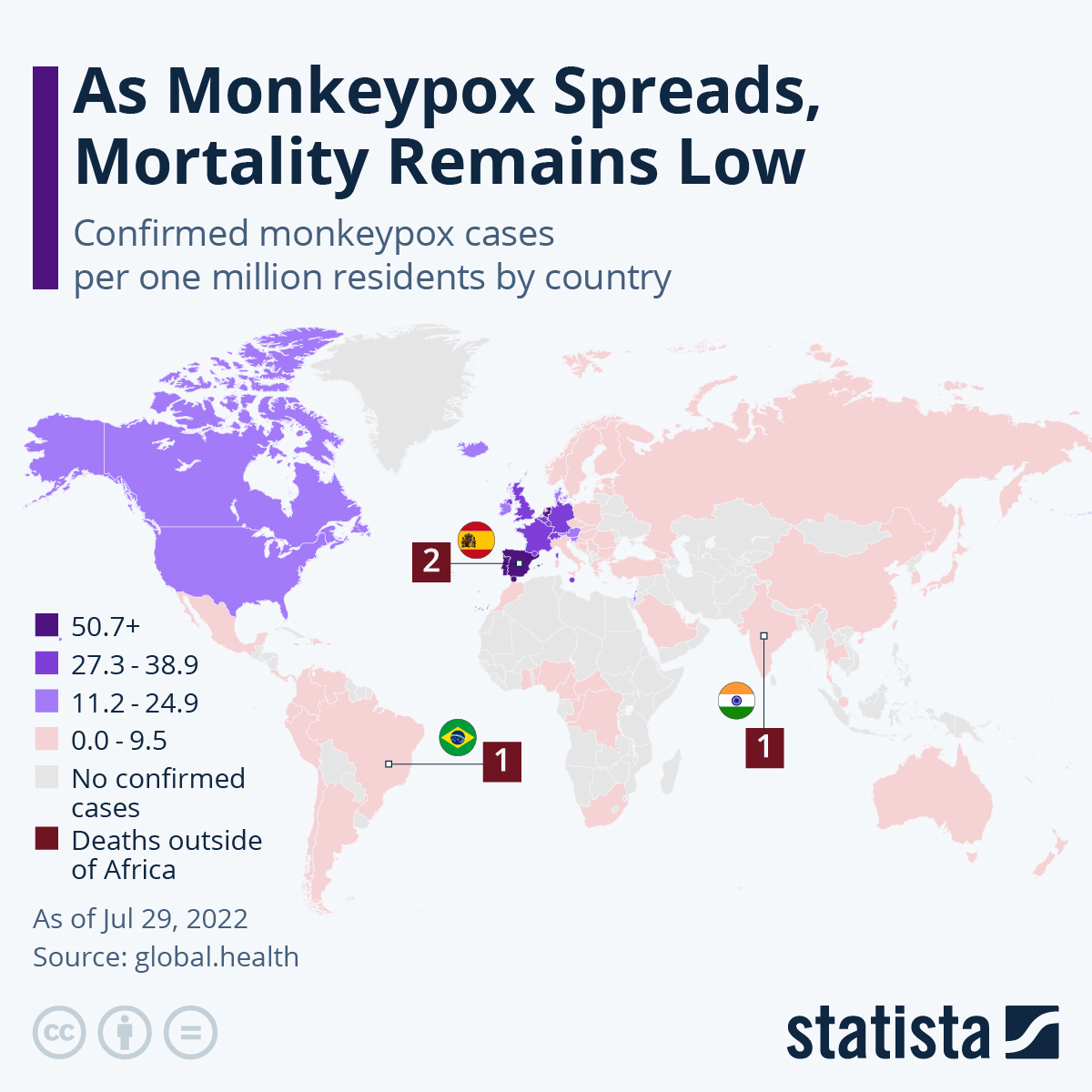
What started as a handful of isolated monkeypox cases in the United Kingdom has officially been declared a Public Health Emergency of International Concern by the World Health Organisation (WHO) on July 23.
As Statista's Florian Zandt reports, the worldwide number of cases has risen to 21,099 as of July 29 according to data by global.health aggregated by Our World in Data. While countries like India, Brazil and Spain have reported the first deaths in connection with the virus, mortality is not a concern yet as our chart shows.
You will find more infographics at Statista
Even in the countries with the highest number of cases per one million residents, Gibraltar, Spain, Portugal and the Netherlands, only Spain reported two deaths which could also potentially be tied to existing comorbidities. Brazil recorded 4.6 cases per one million residents and one death until this past Friday, while India's concentration of 0.003 cases per one million inhabitants has resulted in one death so far. In countries where the disease is endemic, mostly Central African nations, an estimated 70 people have died from or with monkeypox this year. While Nigeria, the United Kingdom, the United States and Singapore saw small clusters of monkeypox infections over the past few years, the current wave already surpasses any recent outbreaks by a considerable margin.
According to the WHO, Monkeypox symptoms include "fever, intense headache, swelling of the lymph nodes, back pain, muscle aches and intense lack of energy" and a skin rash. The virus is primarily transmitted by close physical contact and has, in this specific outbreak, largely been diagnosed in men having sex with men. This has led to concerns about a rise in discrimination against gay and bisexual men, drawing comparisons to the sentiment prevalent during the U.S. AIDS epidemic of the 70s and 80s.
What started as a handful of isolated monkeypox cases in the United Kingdom has officially been declared a Public Health Emergency of International Concern by the World Health Organisation (WHO) on July 23.
As Statista’s Florian Zandt reports, the worldwide number of cases has risen to 21,099 as of July 29 according to data by global.health aggregated by Our World in Data. While countries like India, Brazil and Spain have reported the first deaths in connection with the virus, mortality is not a concern yet as our chart shows.
You will find more infographics at Statista
Even in the countries with the highest number of cases per one million residents, Gibraltar, Spain, Portugal and the Netherlands, only Spain reported two deaths which could also potentially be tied to existing comorbidities. Brazil recorded 4.6 cases per one million residents and one death until this past Friday, while India’s concentration of 0.003 cases per one million inhabitants has resulted in one death so far. In countries where the disease is endemic, mostly Central African nations, an estimated 70 people have died from or with monkeypox this year. While Nigeria, the United Kingdom, the United States and Singapore saw small clusters of monkeypox infections over the past few years, the current wave already surpasses any recent outbreaks by a considerable margin.
According to the WHO, Monkeypox symptoms include “fever, intense headache, swelling of the lymph nodes, back pain, muscle aches and intense lack of energy” and a skin rash. The virus is primarily transmitted by close physical contact and has, in this specific outbreak, largely been diagnosed in men having sex with men. This has led to concerns about a rise in discrimination against gay and bisexual men, drawing comparisons to the sentiment prevalent during the U.S. AIDS epidemic of the 70s and 80s.






